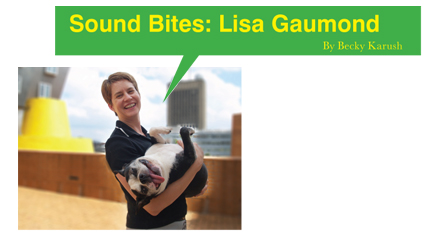What do you do at LIDS?
I’m an Administrative Assistant. Basically I’m part of the support staff, so I have four different faculty members I support. They’re a good bunch. A little feeding, a little watering, and they’re fine.
How long have you worked at MIT?
I started at LIDS in 2004 and at that time I was only supporting one person, but he soon left the institution. So I went to a temp job in the math department for nine months as a senior administrator, and then I went CSAIL. I also started a PhD program then, so I was only working part-time.
Then I came back here about a year ago. It’s interesting here because I’m exposed to things that I would otherwise really run away from.
Like what?
The math stuff, and the engineering things. The students will show me this amazing thing they’ve discovered and I’ll say, Wow, that’s pretty, and poke it. It’s a flux capacitator, they say. And I say, Ohhh. It looks like a paperweight.
I like the students a lot, even though I really have no idea what they’re talking about most of the time. You know, they are so modest! They’ll be doing something on a white board, some complicated pictures of numbers, and I’ll walk by and go, Oh god, no, wait, that’s—you’ll want to check that. And they’ll start checking it! And I’m like, Guys, it’s me, the social scientist.
What do you like about working in LIDS?
I think the smaller labs suit me. But I honestly didn’t even mean to take a real job at LIDS, once my first temp job assignment was up. I actually kind of tried to blow the interview because I knew that I liked it here and that if I stayed I would never go to a PhD program, so I showed up late to the interview, which was just wrong. And when the hiring professor asked if there was anything else he could do to make me more comfortable, I said, “How about a wet bar?” And then I found out that he happened to be a person in the department I could say that to who wouldn’t be offended. He said something like, I was thinking we could do that in the electrical closet!
What do you like about being at MIT?
I love the media lab here. It really overlaps with a lot of work I’m doing, so much that it influences my PhD work. One of the competing topics for my dissertation is actually based right on technology here at MIT.
What is the PhD?
It’s a weird program, actually. I did my Master’s in forensic psychology, and I couldn’t decide whether to do research or clinical work. Then I found this program at a school called Fielding Graduate University with a PhD program in Media Psychology. It’s the only accredited program of its kind in the world that we know of!
You started in forensic psychology?
Well, I ended up officially doing criminal justice because forensic psychology wasn’t a Master’s option where I was. I got to visit crime scenes and see cool stuff at the crime lab in Boston, and hang out with the homicide unit. And once I even got to say, There’s nothing to see here, folks, move along. I really did!
What are your goals for the future?
To pay my mortgage? How far into the future are we talking? Seriously, I would like to—today anyway—write legal narratives for underrepresented populations, to be able to make really cogent arguments on their behalf, or to make their characters come across.
Right now I’m also overly fond of Judge Judy. I absolutely love it! I like the idea of Judy having her agenda, which is to keep within the legal reasoning, but then you have people telling their narratives and the counter-narratives. Plus I like the intrigue of when somebody gets caught in lie. You can tell if the person feels guilt or is aware that, Ooh, I’ve been had.
So I like that it gets illustrated how people come to their own belief systems, and how they grasp or don’t grasp or refuse to grasp any other belief system.
And what about your black and white Boston Terrier, Iggie? Does he always come to work with you?
Oh, the man in my life? Yes, he’s here every day. It’s really interesting to see how all the dogs here get acculturated. On the train, it’s like a Monday for Iggie, too—he just snoozes the whole time, then he gets here and gets in the elevator with another dog, and they don’t look at each other, they just stare straight ahead. He used to have coffee every morning with someone in the math department. He has his own independent life. He keeps me on a need-to-know basis.


